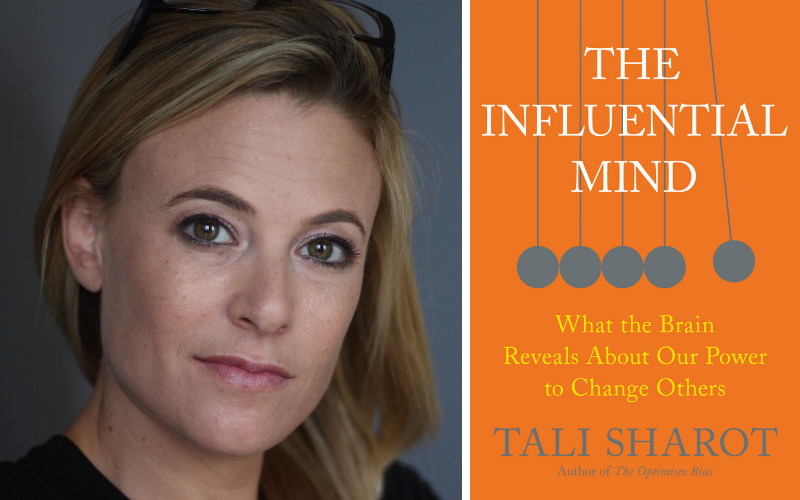 |
| How to change someone's mind, Curious Minds Podcast (2018) |
What drives us humans to grasp a concept? Why do we feel accomplished when we make a decision? Why do we use social referencing, both as an infant and as an adult? Author and psychology professor, Tali Sharot discusses all these questions and more in her book, The Influential Mind.
Throughout her book, she discusses nine most observed behaviors in society and in her empirical, psychology work. Sharot also raises a lot of controversial ideas, such as: "Is 'unanimous' as reassuring as it sounds?" (p. 173); how social learning can effect how we perceive being "unique" (p. 149); and how emotions can effect our choices, behaviors and thoughts (p. 35).

In society we are conditioned to think more is better than less---including when it comes to opinions and decision-making. Sharot's chapter "Is 'Unanimous' as Reassuring as it Sounds?" beginning on page 173, goes into detail why this notion is wrong. However, Sharot points out that time and time again, we choose majority over minority. But why is this the case? Sharot explains that "this notion...dates back to Plymouth, England in 1907" (p. 175), in which the whole crowd guessed the weight of a bull before it was killed for its meat; the crowd's average guess only differed by one percent from the actual weight of the bull (p. 175). This phenomenon was witnessed by Francis Galton, a polymath, who then published this finding in the science journal, Nature (p. 175). After this observation was known, it became the standard way of thinking.
 |
| J.K. Rowling, Harry Potter and the Sorcerer's Stone (1998) |
Sometimes, we have to take risks, just as Barry Cunningham, the author who helped give the famous, beloved author of the Harry Potter series, J.K. Rowling; who chose to value the minority opinion---his daughter, Alice.
 |
| Courtesy of Smithsonian: Air and Space Museum |
 |
| Courtesy of artist, @ punnybone, redbubble |
These biological and psychological processes are not just for politics and persuasion, but also in daily life. Couples for example, who are in a strong relationship claim that there is an unspoken connection with their significant other. Sharot discusses that magic did not happen, nor is it due to "perfect understanding" between couples, but rather, it due to how a couple communicates with one another. However, Sharot explains that this is not just limited to romantic relationships, it can also be platonic relationships, because once again, it is about how we connect and relate to others that increase understanding and intimacy.
 |
| goodreads.com |
Sharot argues that our search for uniqueness is attributed to both innate abilities and social referencing (observing the reactions of others). Therefore, our opinions and decisions are once again attributed to others, we all influence one another, much of which occurs unconsciously. Moreover, Sharot explains that since we want to be unique, we are quick to adapt to what appears to be popular at that specific time...similar to the phenomena of fads (p. 155). By swaying with the majority, we are setting ourselves up to what is considered socially acceptable and how we can break away.
Sharot concludes the chapter by stating, just like in the Plymouth example discussed earlier, following (or disagreeing) social norms can have positive and negative consequences; at times it can broaden ourselves, and other times, it limits our possibilities because the power of influence is a two-way street: while we are influenced by others, we also set the stage for those around us.
Upon reflection, Tali Sharot's book, The Influential Mind is both a controversial, yet gripping. Although some topics raised in her book are repetitive, and overlap occurs in chapters, she does a good job trying to connect her arguments together in a seamless piece.
In summary, our minds are a complicated, yet powerful tool. We as humans have the ability to inspire, change and influence others in more ways than one. While their is truth to strength in numbers, there is also weakness---sometimes we have to take chances and defy the majority---we are all unique want to be unique.

No comments:
Post a Comment